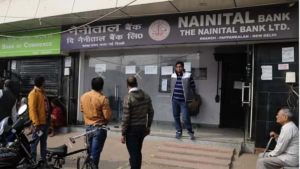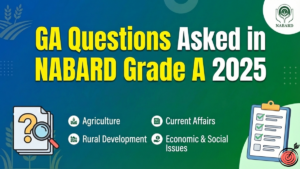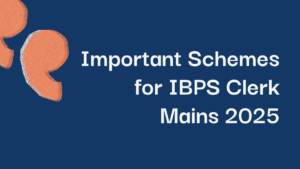General Awareness (GA) is an important section in almost all banking and insurance competitive examinations. Often perceived as a vast and unpredictable area, it can nonetheless be a high-scoring segment if approached with a structured and consistent strategy. Unlike quantitative aptitude or reasoning, GA doesn’t always require complex problem-solving; instead, it tests your breadth of knowledge about current events, the financial world, and static facts. A strong performance in this section can significantly boost your overall score and improve your chances of selection.
Banking General Awareness
To gain a crucial edge in the Banking General Awareness section, aspirants often seek guidance from seasoned experts. In this regard, a valuable opportunity awaits you tomorrow, May 23rd, at 07:00 AM, with a special GA Gurukul! YouTube session led by Ashish Gautam Sir. He will delve into key strategies for cracking the General Awareness section. Participants can expect detailed discussions on crucial current affairs, deep dives into banking and financial awareness topics and practical tips to boost retention and score high. Make sure to join this essential session via the video link provided below to refine your preparation.
Banking General Awareness Syllabus
Before diving into preparation, it’s crucial to understand the diverse components that typically constitute the Banking General Awareness section in banking exams:
- Current Affairs: This is arguably the most dynamic and significant part. It covers national and international news, major government policies and schemes, recent appointments, awards, sports events, significant summits, defense news, and science & technology developments.
- Financial & Banking Awareness: This segment is unique to banking exams and is of paramount importance. It includes topics related to the Indian financial system, Reserve Bank of India (RBI) functions, monetary policy, types of banks, financial institutions, banking terminologies, capital markets, money markets, financial reforms, and important government schemes related to finance and banking.
- Static General Knowledge (GK): This comprises factual information that generally doesn’t change. Key areas include Indian History, Geography, Indian Polity (Constitution), basic Science, Books and Authors, Important Days, Currencies and Capitals, National Parks, and UNESCO World Heritage Sites.
How to Prepare for Current Affairs
Current affairs demand consistent attention. Here’s how to tackle them effectively:
- Daily Newspaper Reading: Make reading at least one reputable national daily newspaper (e.g., The Hindu, The Indian Express, The Economic Times) a non-negotiable part of your routine. Focus on headlines, economic news, government policies, international relations, and significant national events. Avoid getting bogged down by political debates or sensational news.
- Monthly Compilations: Daily reading with monthly or weekly current affairs compilations from reliable educational platforms like Adda247.
- Targeted Focus: Pay special attention to news related to banking, finance, economy, and government schemes. For instance, any new initiatives by RBI, changes in interest rates, or major economic reports are must-knows.
- Regular Revision: Current affairs are volatile. What you read today might be forgotten next week. Dedicate time each week to revise the current affairs of the past few days or weeks. Flashcards or short notes can be very effective here.
Preparation Tips for Financial & Banking Awareness
This section is unique to banking exams and requires specialized preparation.
- RBI Website & Publications: The Reserve Bank of India’s official website is a goldmine of information. Familiarize yourself with its functions, monetary policy tools (Repo Rate, Reverse Repo Rate, CRR, SLR), and recent circulars.
- Financial News: Follow financial news channels or economic newspapers to stay updated on market trends, banking sector developments, and economic policies.
- Study Materials: Invest in a good book dedicated to Banking and Financial Awareness. These books simplify complex concepts and provide a structured overview.
- Key Concepts: Understand core banking terms like NPA, CRAR, Basel norms, types of accounts, negotiable instruments, etc.
- Government Schemes: Pay close attention to government schemes related to financial inclusion, social security and other economic initiatives.
- Budget and Economic Survey: Go through the highlights of the Union Budget and the Economic Survey for the current and previous financial years. Focus on key figures, allocations, and major announcements.
Join Ashish Gautam Sir’s GA Gurukul Session
To further enhance your General Awareness preparation and gain insights from an expert, consider joining the upcoming YouTube session with Ashish Gautam Sir. This dedicated “GA Gurukul!” session is scheduled for tomorrow, May 23rd, at 07:00 AM. Make sure to tune in via the video link provided below to benefit from his guidance and strategic tips, which can be invaluable for your banking exam journey.
Common Mistakes to Avoid while preparing for Banking General Awareness
Even with a solid strategy, certain pitfalls can derail your General Awareness preparation. Being aware of these can help you steer clear:
- Last-Minute Cramming: GA is a vast subject. Attempting to absorb months of current affairs and static facts just days before the exam is a recipe for disaster. Information overload leads to poor retention and confusion.
- Ignoring Financial & Banking Awareness: Some aspirants focus heavily on general current affairs but neglect the banking-specific aspects. This is a critical error, as financial awareness carries significant weight and is often a distinguishing factor.
- Passive Reading: Simply reading newspapers or monthly magazines without actively making notes or highlighting key points is ineffective. Engaged learning, where you process and organize information, is crucial for recall.
- Neglecting Revision: Current affairs, in particular, have a short shelf life in memory if not regularly revisited. Skipping revisions means constantly relearning, which is inefficient.
- Not Practicing Enough: Theoretical knowledge is only half the battle. Without attempting mock tests and previous year papers, you won’t understand how questions are framed or manage your time effectively in the actual exam.
- Getting Bogged Down by Details: While details are important, don’t get lost in minutiae that are unlikely to be tested. Focus on significant events, key figures, and their broader implications.
- Ignoring Static GK: In the pursuit of current events, many candidates sideline static GK. This is a mistake, as static facts form a consistent portion of the GA section and are relatively easier to score in once learned.
- Lack of Analysis Post-Mock Test: Simply taking a mock test isn’t enough. The real learning happens during the analysis phase, where you identify patterns, understand your weaknesses, and refine your strategy.





 GA Questions Asked In Nainital Bank Cler...
GA Questions Asked In Nainital Bank Cler...
 GA Questions Asked in NABARD Grade A 202...
GA Questions Asked in NABARD Grade A 202...
 Important Schemes for IBPS Clerk Mains 2...
Important Schemes for IBPS Clerk Mains 2...








